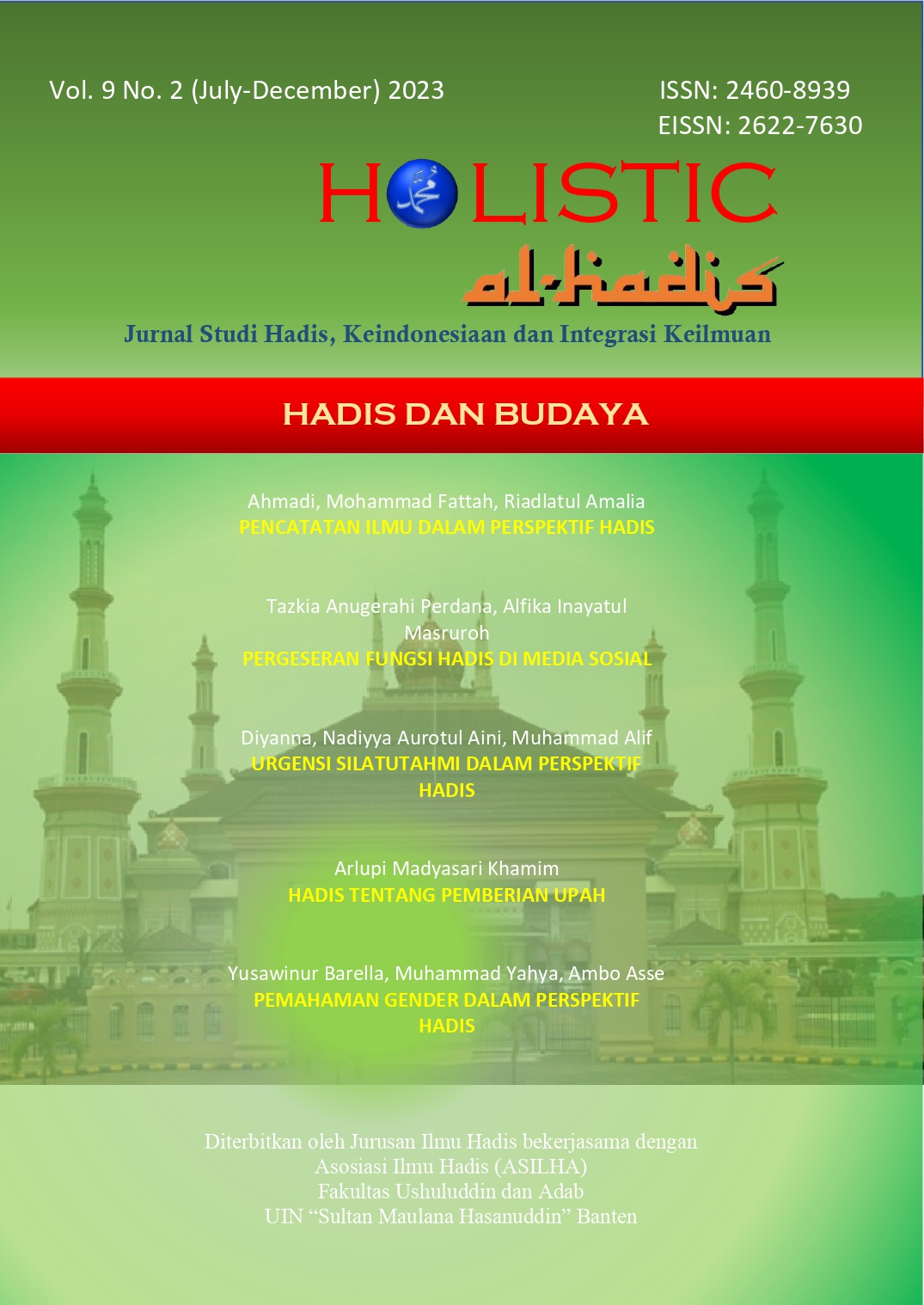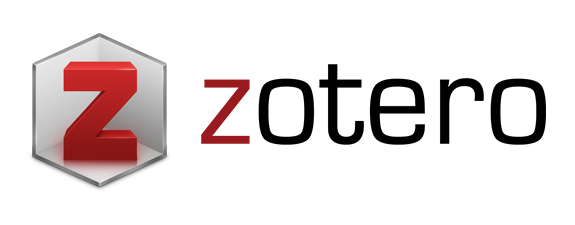URGENSI SILATURAHMI DALAM PERSPEKTIF HADIS
DOI:
https://doi.org/10.32678/holistic.v9i2.9820Keywords:
Gathering; Green Future; Hadith; Thematic Hadith; UrgencyAbstract
Gathering has become a culture that is closely related to the social life of society in Indonesia and is very crucial from an Islamic perspective, especially for a green future with sustainable Islamic values. Even the Prophet Muhammad SAW strongly recommended keeping in touch with each other, as has been mentioned in many hadiths. This research aims to discuss the urgency of Gathering from a hadith perspective to create a green future of Islamic values. The formulation of the problem in this research is how the hadith views the urgency of Gathering as an important factor for creating a green future of Islamic values. In this research, a qualitative approach was used with the application of the hadith thematic method. The formal object of this research is the understanding and urgency of Gathering which is formulated of the hadith theme. Then the results obtained indicate that the theme of hadith can be formulated into a theoretical framework about the urgency of Gathering in the perspective of hadith and gathering is very much needed in efforts to realize a green future of Islamic values. The discussion in this study explains that the urgency of Gathering is highly recommended by the prophet and has a special place because it has a direct relationship with Allah so that it will have a bad impact if it breaks the Gathering. The conclusion of this study is that Gathering has a crucial urgency for society and life so that it has a reciprocal impact and has various types according to the purpose of carrying out Gathering and can help in realizing a green future of Islamic values.
Downloads
References
Abū Dāwud, Sulaimān ibn al-Asy`aṡ ibn Isḥāq ibn Basyīr ibn Syidād ibn `Amru al-Azdiy al-Sijistāniy. Sunan Abī Dāwud. Edited by Syu`aib al-Arna’ūṭ. Dār al-Risālah al-`Ālamiyah, 2009.
al-Bukhāriy, Abū `Abdillāh Muḥammad ibn Ismā`īl ibn Ibrāhīm ibn al-Mugīrah al-Ju`fiy. Al-Jāmi` Al-Musnad Al-Ṣaḥīḥ Al-Mukhtaṣar Min Umūr Rasūlillah Ṣallā Allāh `alaih Wasallam Wa Sunanih Wa Ayyāmih. Edited by Muḥammad Zuhair ibn Nāṣir al-Nāṣir. Dār Ṭauq al-Najāt, 1422.
al-Bukhāriy, Abū ʻAbdillāh Muḥammad ibn Ismāʻīl ibn Ibrāhīm ibn al-Mugīrah al-Juʻfiy al-. Al-Adab Al-Mufrad. Edited by Muhammad Fouad Abd Al-Baqi Penerbit : Al-Salafi Press and its Library - Kairo. 2nd ed. Kairo: Dar Al-Bashir Al-Islamiyyah, 1379.
Al-Maraghi, Ahmad Mustafa. Tafsir Al-Maraghi. Jilid 3. Kairo: Musthafa Al-Babl Al-Halabi, 1962.
al-Tirmiżiy, Abū `Īsā Muḥammad ibn `Īsā ibn Saurah ibn Mūsā al-Ḍaḥḥak. Al-Jāmi` Al-Kabīr Wahuwa Sunan Al-Tirmiżiy. Edited by Aḥmad Muḥammad Syākir. Muṣṭafā al-Bābī al-Ḥalabiy, 1975.
Cahyana, I Made, Ismirihah Aeres, and Fahmi Rival M Rijalul. ‘Silaturahmi Melalui Media Sosial Perspektif Hadits ( Metode Syarah Hadits Bil Ra ’ Yi ).’ Jurnal Pendidikan Dan Pendidikan Agama Islam 3, no. 2 (2021).
Darmalaksana, Wahyudin. ‘Studi Flexing Dalam Pandangan Hadis Dengan Metode Tematik Dan Analisis Etika Media Sosial’. Gunung Djati Conference Series 8 (2022): 412–27. Accessed https://conferences.uinsgd.ac.id/gdcs.
Darussalam, Ahmad. ‘Wawasan Hadis Tentang Silaturahmi’. Tahdis 8 (2017): 116–32.
Dea, and Muhammad Alif. ‘Kuriositas Dalam Perspektif Hadis’. In The International Conference on Ushuluddin and Humanities Studies, 1–20. Banjarmasin: ICONUSH: International Conference On Ushuluddin and Humanities Studies, 2023.
Diyanna. ‘Ebook Urgensi Silaturahmi’. 18-06-2023, 2023. Accessed https://s.id/1MSKp.
Erasmus, Jonathan. ‘What Should We Be Thinking about When Talking about a Green Future?’ Open Access Government, 2020. Accessed 7 September 2023 https://www.openaccessgovernment.org/what-should-we-be-thinking-about-when-talking-about-a-green-future/95797/.
Fahmi, Rival Muhammad Rijalul, Ismirihah Aeres, I Made Cahyana Tri Wibawa, and M.Ag Dr. Reza Pahlevi Dalimunthe. ‘Silaturahmi Melalui Media Sosial Perspektif Hadits’. AL-HIKMAH (Jurnal Pendidikan Dan Pendidikan Agama Islam) 3, no. 2 (2021): 214–25. Accessed http://www.ejournal.uniks.ac.id/index.php/Alhikmah/article/view/1201.
Hausfather, Zeke. ‘Analysis: Why Scientists Think 100% of Global Warming Is Due to Humans’. Carbon Brief, 2023. Accessed 7 September 2023 https://www.carbonbrief.org/analysis-why-scientists-think-100-of-global-warming-is-due-to-humans.
Ibn al-Ḥajjāj, Muslim. Al-Musnad Al-Ṣaḥīḥ Al-Mukhtaṣar Binaql Al-`Adl `an Al-`Adl Ilā Rasūlillah Ṣallā Allāh `alaih Wasallam. Edited by Muḥammad Fu’ād Abd al-Bāqī. Vol. 1–3. Dār Iḥyā’ al-Turāṡ al-`Arabiy, 1424.
Ibn Ḥanbal, Aḥmad. Musnad Al-Imām Aḥmad Ibn Ḥanbal. Edited by Aḥmad Muḥammad Syākir. Dār al-Ḥadīṡ, 1995.
Iffah, Fadhillah, and Yuni Fitri Yasni. ‘Manusia Sebagai Makhluk Sosial Pertemuan’. Lathaif: Literasi Tafsir, Hadis Dan Filologi 1, no. 1 (2022): 38–47.
Istianah. ‘Shilaturrahim Sebagai Upaya Menyambungkan Tali Yang Terputus’. Riwayah : Jurnal Studi Hadis 2, no. 2 (2018): 199. Accessed doi:10.21043/riwayah.v2i2.3143.
Kaltsum, Lilik Ummi. ‘Hubungan Kekeluargaan Perspektif Al-Qur’an (Studi Term Silaturahmi Dengan Metode Tematis)’. Al-Bayan: Jurnal Studi Ilmu Al- Qur’an Dan Tafsir 6, no. 1 (2021). Accessed doi:10.15575/al-bayan.v6i1.9539.
Kementerian Pendidikan Nasional. Kamus Besar Bahasa Indonesia. Cet. IV. Jakarta: Balai Pustaka, 2007.
Muslim, Asrul. ‘Interaksi Sosial Dalam Masyarakat Multietnis’. Jurnal Diskursus Islam 1, no. 3 (2013).
Nugroho, Badar Agung. ‘Penerapan Komputasi Hijau Di Lingkungan Pemerintah Daerah Dan Perusahaan Bidang Teknologi Informasi’. Jurnal Penelitian Komunikasi 16, no. 1 (2013): 91–100. Accessed doi:10.20422/jpk.v16i1.33.
Nurjannah, Siti. ‘Living Hadis: Tradisi Rebo Wekasan Di Pondok Pesantren Mqhs Al-Kamaliyah Babakan Ciwaringin Cirebon’. Diya Al-Afkar: Jurnal Studi Al-Quran Dan Al-Hadis 5, no. 01 (2017): 219. Accessed doi:10.24235/diyaafkar.v5i01.4340.
Nurussoufi, A. ‘Kualitas Silaturahmi Dan Toleransi Beragama Masyarakat Desa Karangrena’. Al-Munqidz: Jurnal Kajian Keislaman 3, no. 3 (2022): 208–32. Accessed https://jurnal.unugha.ac.id/index.php/amk/article/view/480%0Ahttps://jurnal.unugha.ac.id/index.php/amk/article/download/480/278.
Nurvinta, Yeni. ‘Hubungan Antara Interaksi Sosial Dengan Konsep Diri Pada Peserta Didik Kelas Viii Mts’. Skripsi BK FKIP Untan Pontianak, 2017, 1–7.
Ridho, Muhammad, Muhammad Risky Pratama, Bagust Dwicahya, Yan Sutardi, Paul Parluhutan, Patriaganesha Hutahaean, Faisadhani Ashari, et al. ‘Pergeseran Metode Silaturahmi Di Indonesia Sebagai Dampak Pandemi Covid-19’. Jurnal Pendidikan Kewarganegaraan 8, no. 1 (2021).
Rizal, Syamsur. ‘Model Pembelajaran Hadist Integratif’. EDISI : Jurnal Edukasi Dan Sains 1 (2019): 178–96.
Ṣan’anī, Al Imām Muhammad bin Ismāīl al-Amīr al-Yamānī. Subūl Al-Salām Syarh Bulūgh Al-Marām Min Jami‟ Abdillah Al-Ahkam. Beirut: Dār al-Kutub al-Ilmiyyah, 2014.
Syafe’i, Rachmat. Al-Hadis: Aqidah, Akhlak, Sosial Dan Hukum. Bandung: CV Pustaka Setia, n.d.
Wahyudi, Agus. ‘Keutamaan Dan Larangan Memutus Silaturahmi Dalam Islam’. ZNEWS.ID JAKARTA, 2022. Accessed 8 September 2023 https://znews.id/keutamaan-dan-larangan-memutus-silaturahmi-dalam-islam/.
Downloads
Published
Issue
Section
License
Copyright (c) 2023 Diyanna Diyanna, Nadiyya Qurotul Aini, Muhammad Alif

This work is licensed under a Creative Commons Attribution 4.0 International License.
Authors who publish with this journal agree to the following terms:
-
Authors retain copyright and grant the journal right of first publication with the work simultaneously licensed under a Creative Commons Attribution License that allows others to share the work with an acknowledgement of the work's authorship and initial publication in this journal.
-
Authors are able to enter into separate, additional contractual arrangements for the non-exclusive distribution of the journal's published version of the work (e.g., post it to an institutional repository or publish it in a book), with an acknowledgement of its initial publication in this journal.
-
Authors are permitted and encouraged to post their work online (e.g., in institutional repositories or on their website) prior to and during the submission process, as it can lead to productive exchanges, as well as earlier and greater citation of published work (See The Effect of Open Access).


















